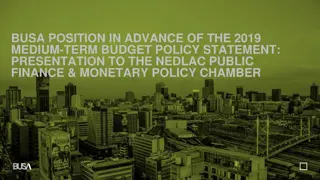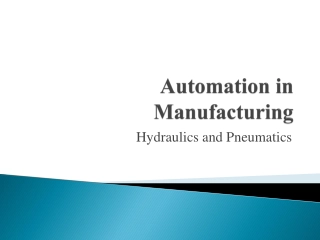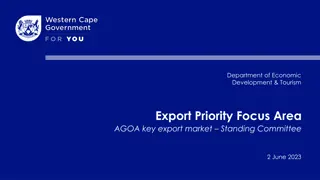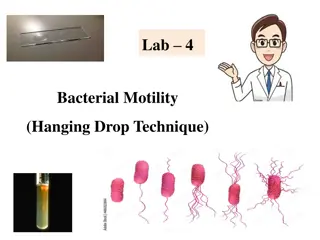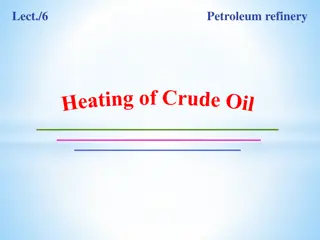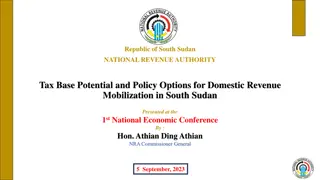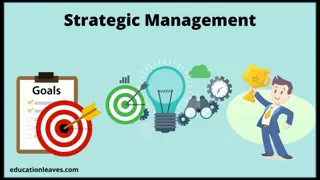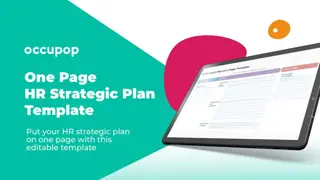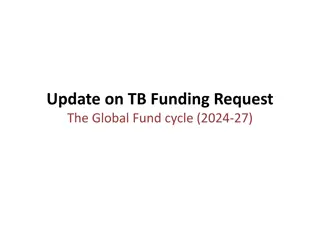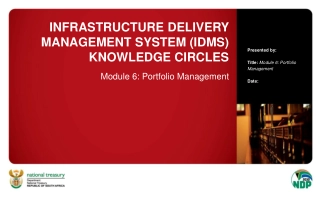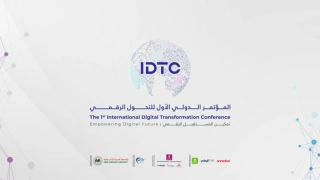Strategic Roadmap for Nigeria's Petroleum Industry: 2019-2023
This document outlines the key strategic priorities set by the Ministry of Petroleum Resources in Nigeria for the period 2019-2023. It covers objectives such as eradicating fuel smuggling, increasing crude oil production, reducing extraction costs, promoting legislative reforms, enhancing refining capacity, creating job opportunities, and aiming to lift millions out of poverty. The roadmap also includes specific action items to monitor and improve various aspects of the oil and gas sector.
Download Presentation
Please find below an Image/Link to download the presentation.
The content on the website is provided AS IS for your information and personal use only. It may not be sold, licensed, or shared on other websites without obtaining consent from the author. Download presentation by click this link. If you encounter any issues during the download, it is possible that the publisher has removed the file from their server.
Presentation Transcript
MINISTRY OF PETROLEUM RESOURCES MINISTRY OF PETROLEUM RESOURCES 2022 2022 SCORECARD SCORECARD
Amb. Gabriel TanimuAduda Permanent Secretary, Ministry of Petroleum Resources MINISTRY OF 4 PETROLEUM RESOURCES
PRESENTATION PRESENTATIONOUTLINE OUTLINE INTRODUCTIONAND BACKGROUND AGENCIESAND THEIR PRIORITY AREAS PROGRESSREPORT 5
Introduction Introduction Mandate, Ministry Ministry Mandate, Vision Vision & & Mission Statements Mission Statements of of the the Mandate Vision Mission T oformulate Policies, Supervise their Implementation and Regulatethe Nigerian Oil & Gas (Energy) Industry To thriving Oil & Gas (Energy) Industry for Nigeria deliver a Ensure an enabling environment to improve the oil and gasvalue chain, driven by modern technology, industry best practices stakeholder engagementand innovations in alternative energy. 6
Oil & Gas Strategic Priorities (2019 2023) 1 2 3 4 Eradicate smuggling of PMS across Nigerian borders Complete Gas Flare Commercializatio n Program Increase Crude Oil Production to 3 million barrels per day Reduce the Cost of Crude Oil Extraction by at least 5% 5 6 7 8 Aggressively promote the passage of the Petroleum Industry Bill (PIB) Promote passage of the Deep Offshore & Inland Basin Production Sharing Contract Amendment Working with the Private Sector Operators to increase Domestic Refining Capacity Collaborate with the Private Sector to create many well-paying jobs 9 Implement a strategy toward taking 100 million Nigerians out of poverty 7
CONSOLIDATED CONSOLIDATEDROADMAP ROADMAP FOR FOR 2019 2019- -2023 2023 1. Set up Programme Monitoring Office/Committee. 2. Strengthen real-time tracking of supply and distribution. 3. Deliver Project White and improve security in the operating environment. 4. Monitor products from land and marine depots. 5. Clean up inventory of licensed Stations. 6. Strengthen NASS and other stakeholder engagements. 7. Improve inter-agency collaboration and data standardization. 8. Address non-performing operations. 9. Increase collaboration with the private sector. 10.Complete the bidding process and reduce the contracting cycle. 11.Deepen LPG penetration. 12.Provide infrastructure in Free Trade Zones. 13.Improve accounting, cost management and transparency. 14.Optimize the current production cycle. 15.Optimize the contract tendering process to shorten the cycle. 16.Domesticate EGTL diesel. 17.Develop capacity and capabilities in all areas. 18.Sustain enforcement of Nigerian Content Laws. 8
CONSOLIDATED CONSOLIDATEDROADMAP ROADMAP FOR FOR 2019 2019- -2023 2023 (Continued) (Continued) 1. Demolish illegal Stations. 2. Deliver Zero-Loss Security across the value chain and strengthen 3. enforcement. 4. Commence operations on the Nigerian Gas Flare Programme 5. Conduct bid rounds and open up new frontiers. 6. Divest from sub-optimal fields. 7. Increase exploration activities and streamline regulatory and licensing processes. 8. Reduce Crude Oil handling charges and high financing costs. 9. Implement National Project on a historical database for the Oil & 10.Gas sector. 11.Complete the assessment of repairs and put two refineries back into use. 12.Formulate Policy on Bid Rounds and incentives to encourage investment. 13.Create industrial parks and promote infrastructure in Free trade Zones. 14.Develop Blueprint for Youths Training and Skills Acquisition Commercialization 9
1. Demolish illegal Stations. 2. Deliver Zero-Loss Security across the value chain and strengthen 3. enforcement. 4. Commence operations on the Nigerian Gas Flare Commercialization Programme 5. Conduct bid rounds and open up new frontiers. 6. Divest from sub-optimal fields. 7. Increase exploration activities and streamline regulatory and licensing processes. 8. Reduce Crude Oil handling charges and high financing costs. 9. Implement National Project on a historical database for the Oil & 10.Gas sector. 11.Complete the assessment of repairs and put two refineries back into use. 12.Formulate Policy on Bid Rounds and incentives to encourage investment. 13.Create industrial parks and promote infrastructure in Free trade Zones. 14.Develop Blueprint for Youths Training and Skills Acquisition 10
Agencies/Parastatals Agencies/Parastatals Nigeria National Nigeria National Petroleum Company Company (NNPC) (NNPC) Limited Petroleum Limited Nigerian Midstream Nigerian Midstream and Downstream DownstreamPetroleum Regulatory RegulatoryAuthority and Nigerian Upstream Nigerian Upstream Petroleum Petroleum Regulatory Regulatory Commission (NUPRC) Commission (NUPRC) Petroleum Authority (NMDPRA) (NMDPRA) MINISTRY MINISTRY OF PETROLEUM PETROLEUM RESOURCES RESOURCES OF Nigerian Nigerian Content Management Board Board(NCDMB) (NCDMB) Content Petroleum Petroleum Training (PTI) (PTI) Training Institute Institute Development Development Management eum eum Technology Technology Development Development Fund (PTDF) Nigeria Nigeria Nuclear Nuclear Regu Authority Authority (NNRA) Regu Fund (PTDF) (NNRA) 11 1
Ministry of Petroleum Resources Ministry of Petroleum Resources >> >> Oil and Gas Strategic Priorities (2019 Oil and Gas Strategic Priorities (2019 2023) 2023) Increased prospects of Foreign Direct Investment (FDI) in the Sector via Bilateral and Multilateral Agreements Implementation of the Decade of Gas Initiatives Launched the National Gas Expansion Program Security of the N250 Billion CBN/NIRSAL/NGEP Intervention Facility Increase in the establishment of LPG plants and Modular Refineries Implementation of the Petroleum Industry Act (PIA) 2021. Putting in place the new fiscal regime for Nigeria's petroleum industry, administered by the Commission (Royalty) and FIRS (National Hydrocarbon Tax and CITA). Publishing in an official gazette - the Host Communities Trust Fund regulations Commencement Change management processes in all PIA- created institutions, including asset and personnel audit Enhancement of local refining capacity Simplified Processes for Bid rounds and Cost Reduction 12
NIGERIAN NIGERIAN NATIONAL > Priority PriorityAreas Areas NATIONALPETROLEUM PETROLEUM COMPANY COMPANY LIMITED LIMITED Expansion of gas sector footprint to stimulate industrialization Ventures capitalization & commercialization Production & Reserve growth GAS GAS & & POWER POWER UPSTREAM UPSTREAM VENTURES VENTURES PetroleumProducts supply& NationalEnergy security Enhancementof local refining capacity Availabilityof critical Downstream infrastructure DOWNSTREAM DOWNSTREAM REFINERIES REFINERIES 13
Nigerian Nigerian Upstream Upstream Petroleum Commission (NUPRC) Commission (NUPRC) > > Priority Petroleum Regulatory Regulatory Priority Areas Areas Advising Government and relevant Government agencies on technical matters and public policies that may have animpact on the administration and petroleum activities. promulgation of new regulations for Upstream operations Ensure timely and accurate payments of Rent, Royalties, and other revenues due to the government, processing industry applications for leases, licenses, and permits. conversion of extant upstream licences (OMLs and OPLs to PMLS and PPLs) to conform with PIA terms Monitoring the Petroleum Industry operations to ensure that is in line with national goals and aspirations including those relating to Flare down and Domestic Gas Supply Obligations. EXPLORATION EXPLORATION& & ACREAGE ACREAGE MANAGEMENT MANAGEMENT ECONOMIC ECONOMIC REGULATION & REGULATION & STRATEGIC STRATEGICPLANNING PLANNING DEVELOPMENT DEVELOPMENT & & PRODUCTION PRODUCTION Maintaining records on petroleum industry operations, particularly on matters relating to petroleum reserves, production/exports, licenses,and leases. Guidelines For Management Of Fugitive Methane and Greenhouse Gases Emissions In The Upstream Oil And Gas Operations In Nigeria Ensuring that Health Safety& Environment regulationsconform with national and international best oil field practices. CORPORATE CORPORATE SERVICE & SERVICE & ADMINISTRATION ADMINISTRATION CLIMATE CHANGE CLIMATE CHANGE MITIGATION MITIGATION HEALTH, HEALTH,SAFETY, ENVIRONMENT & ENVIRONMENT & COMMUNITY COMMUNITY SAFETY, 14
PETROLEUM PETROLEUM TRAINING TRAINING INSTITUTE INSTITUTE (PTI) (PTI) > Priority > Priority Areas Areas Training of Key TechnicalManpower Collaboration& Partnership 1 2 2. 2. 15
PETROLEUM TECHNOLOGY DEVELOPMENT FUND PETROLEUM TECHNOLOGY DEVELOPMENT FUND (PTDF) > Priority PriorityAreas Areas (PTDF) 1. 1. BuildingCapacities, Capabilities & Competencies Commencement of training on PIA processes for all personnel in public agencies in the petroleum sector 2. 2. The Funds New StrategicDirection 3. 3. Upgrade & Infrastructural Development 4. 4. Universities Upgrade Project 16
NIGERIAN NIGERIAN NUCLEAR Priority PriorityAreas Areas NUCLEAR REGULATORY REGULATORYAGENCY AGENCY (NNRA) (NNRA) > > 1. 1. Regulate the bulk storage, distribution, marketing, transportation pipelinesof petroleum products. 2. 2. 6. 6. Ensure security of supply, development of the market and ompetitionin the natural gas and petroleum products market. Ensure efficient, safe, effective and sustainable infrastructural development in midstream and downstream petroleum operations 3. 3. romote competition and private sector rticipationin midstream and downstream petroleumoperations. 4. 4. 7. 7. Promote healthy, safe, efficient and effective conduct of mid/downstream petroleum operations in an environmentally sustainable manner Regulateand monitor midstream and downstream operationsinNigeria. 5. 5.5. 5. et, define, and enforceapproved standards and regulations for design, construction, fabrication, operation, maintenanceof plants, installations,and facilities used or to be used in midstreamand downstream petroleumoperations. 17
NIGERIAN CONTENT DEVELOPMENT AND MONITORING BOARD (NCDMB) > Priority Areas 5 5 STRATEGIC STRATEGICPILLARS PILLARS Funding Funding Stakeholder Engagement Stakeholder Engagement Regulatory Regulatory Environment Environment Research Research and and Statistics Statistics Building Capacities, Building Capacities, Capabilities Capabilities & & Competencies Competencies The The Funds Funds New New Strategic Direction Strategic Direction Upgrade Upgrade & Infrastructural Development & Infrastructural Development Universities Universities Upgrade Upgrade Project Project 18 Project Project100 100
Nigerian Nigerian Midstream Midstream and Authority Authority (NMDPRA) (NMDPRA) > Priority and Downstream Downstream Petroleum > Priority Areas Areas Petroleum Regulatory Regulatory 1. 1. Regulate the bulk storage, distribution, marketing, transportation pipelinesof petroleum products. 2. 2. Ensure security of supply, development of the market and ompetitionin the natural gas and petroleum products market. 3. 3. Promote competition and private sector participationin midstre and downstream petroleumoperations 4. 4. Regulateand monitor midstream and downstream operationsinNigeria Promulgation of regulations for Mid & Downstream operations. 5. 5. Set, define, and enforceapproved standards and regulations for design, construction, fabrication, operation, maintenanceof plants, installations,and facilities used or to be used in midstreamand downstream petroleumoperations. 19
TOP TOPPRIORITIES PRIORITIES TO OUT OUT OF OF POVERTY TOTAKE TAKE100 POVERTY IN 100 MILLION MILLION IN 10 10 YEARS YEARS 4. 4. 2. 2. Bid Rounds & Cost Reduction CorporateSoci Responsibility (CSR) Youth Training, Skills Developmentand Empowerment Industry Drive Trainingand Talent Acquisition 3. 3. 1. 1. 20
PROGRESS PROGRESS REPORT REPORT TARGET TARGET (Expected (ExpectedMilestones) Milestones) PROGRESS PROGRESS (Achieved (Achieved Milestones) Milestones) KEY KEY ISSUES ISSUES (Challenges) (Challenges) SUPPORT SUPPORT REQUIRED REQUIRED 1. Eradicate smugglingof PMS across Nigerian borders 5. Aggressively promotePassage of the Petroleum IndustryBill 7. Workingwith Private Sector Operators to Increase Domestic Refining Capacity 9. Implement Strategy towards taking 100 Million Nigerians out of Poverty 3.IncreaseCrude Oil Productionto 3mbpd 6. Promote Passage of Deep Offshore & Inland Basin Production Sharing ContractAmendment 8. Collaborate with Private Sector to Createa large number of Well-paying jobs 4. Reduce Cost of Crude Oil Extraction by at least 5% 2. CompleteGasFlare Commercialization Program 21
DELIVERABLE Eradicate smuggling of PMS across Nigerian borders 01. SUPPORT SUPPORT REQUIRED REQUIRED KEY KEYISSUES ISSUES PROGRESS PROGRESS ACHIEVED ACHIEVED TARGETS Relaunch of Project White for monitoring and Tracking of products distribution Nation-wide 1.Ensure energy sufficiency in power and petroleum products 1. Marketersinfractions 1. Full System automation 2. Defaultingmarketers 2. Review of existing penalties 255,659 255,659truck out equalized 3. Delay in submissionof productoutturnform by marketers 2.Ensure reduction in volumeof smuggledPMS through improved technology including DAPMIS and MPMS 11,622,926,494 11,622,926,494litres equalized 3. Ensure strict compliance to regulations 173,200,284,779 173,200,284,779Naira (Approx.) Equalisation Paid * 4. Arrival/dischargequantity variation 4.Strong inter-agency collaboration and transparency for petroleum product supply value chain activities around the border 3.PMS Equalisationto close differentialcost 1277 1277supplyingvesselstracked 5. Sharp practicesby operators 25,525,688,042 25,525,688,042litres of total PMS discharged 4.Undertakeroutine end to end tracking of Petroleum Products Cargos using Lloyds List Intelligenceand Refinitiv. 66.7 66.7Million MillionLts average daily sufficiency 24,346,614,589 24,346,614,589ltrs total truck out volume * Reconciliation of 2022 Payment in progress 22
DELIVERABLE Complete Gas Flare Commercialization Program 02. SUPPORT SUPPORT REQUIRED REQUIRED KEY KEYISSUES ISSUES PROGRESS PROGRESS ACHIEVED ACHIEVED TARGETS 1.80%Completionof GFCP 1. 8.6% 8.6%changein domestic LPG demand 1. More sensitization neededfor operatorsand users. 1. Inadequatesensitization 2.LPG Penetrationfor productavailability 2. PIA 2021 implementation issues 2. 1,064,660 MT domestic LPG consumption 2. More collaboration between SectorRegulators and industryplayers 3.Interventionprograms such as Nigerian Gas Expansion Program 3. 3. Evaluation Studieson- going.(50% (50%completed). completed). 4.Stakeholdersengagement 4. Framework review ongoing Evaluationand study on the impact of Gas penetration programme in the Nigerian economy 5. Forty-eight (48) Flare sites have been identified. Six (6) of them have been taken out of the basket because they are not commercially viable (because the flare volumes are minimal).The plan is that these flare sites will be allocatedby Q4 2022. 5.Consultancy service for the Development of CNG/LNGTemplatesfor the Agency's AdvisoryServices 23
DELIVERABLE Increase Crude Oil Production to 3mbpd 03. PROGRESS PROGRESS ACHIEVED ACHIEVED 1.Emplacement of contract for pipeline surveillance and security and setting up of Control Centre for Crude oil movement tracking KEY KEYISSUES ISSUES SUPPORT SUPPORT REQUIRED REQUIRED TARGETS 1.Mobilise domestic revenues and eliminate revenue leakages 1. IncreasedOPEC quota 1. OPEC + cut 2.DeepDrilling 2. Vandalism& Militancy 2. Collaborationat highest level with securityagencies 3. Completed 2D Seismic Data Acquisitionin Bida Basin 2.Optimizecurrent crude Oil Productionin existingwells 4. Security Support Committee for Chad Basin Re-entry Inaugurated Multi-Agency 3.Increase Exploration activitiesto achievetarget 5.Set up response Team to repair any interference on PipelineNetwork 4.Reducecontractingcycle to at leastsix (6) months 5.Mature other existing opportunities within the Frontier& LocalProduction 6.Resolution of 1993 PSC dispute which holds over 90% of our Deepwater production that is expected to unlock $500 Billion revenue and about $30Billion in FDI 6.Improve Security in Operatingenvironmentto protectpipelines 7. Flag-off of the Kolmani Integrated Development Project (KIPRO) with contribution of 120,000bpd output 24
DELIVERABLE Reduction of Cost of Crude Extraction 04. KEY KEYISSUES ISSUES PROGRESS PROGRESS ACHIEVED ACHIEVED SUPPORT SUPPORT REQUIRED REQUIRED TARGETS 1. Relaunchedthe Ministerial Committee with new mandates on cost reduction/crashing long contractingcycles 1. Strong collaboration among agencies to ensure elimination of multiple tax/charges regimes Capacity building on Cost Engineering and Control 1. Fundingof committee s activities 1. Ensure proper Project Definitionas requirementfor sanctioning 2. Capacityenhancement on cost engineering, benchmarking and monitoring 2. Create sharedIndustry Spare Parts Database 2. LaunchedUpstream Cost OptimizationInitiative 3.Improve capabilities in Cost Engineering& Project Management 2. 3. Deployedexpress Projects Cost Database 4.Minimize single sourcing 4.Sustained Transparency, Accountability& Performance Excellence Initiative 25
DELIVERABLE Aggressively promote Passage of the Petroleum Industry Bill 05. KEY KEYISSUES ISSUES PROGRESS PROGRESS ACHIEVED ACHIEVED SUPPORT SUPPORT REQUIRED REQUIRED TARGET PIA Implementation Committee Constituted Bill Passed by NASS and Assented to by His Excellency, Mr. Presidentas Petroleum Industry Act (PIA), 2021 Reorganization agencies in line with new mandates of new Strengtheningthe Office of the HMSPR to function effectively after the expiration of the tenure of the PIA implementation committee Upstream Commission Established Separationof assetsand liabilities Midstream & Downstream Authority Established NNPC Limited Incorporated 26
Promote Passage of Deep Offshore & Inland Basin Production Sharing ContractAmendment DELIVERABLE 06. KEY KEYISSUES ISSUES PROGRESS PROGRESS ACHIEVED ACHIEVED SUPPORT SUPPORT REQUIRED REQUIRED TARGET None None The enactment of PIA has subsumed the Deep Offshore & Inland Basin Production Sharing Contract Amendment Bill Passed by NASS and Assented to by His Excellency,Mr. President 27
Working with Private Sector Operators Refining Capacity to Increase Domestic DELIVERABLE 07. KEY KEYISSUES ISSUES PROGRESS PROGRESS ACHIEVED ACHIEVED SUPPORT SUPPORT REQUIRED REQUIRED TARGETS 1. Crude supplyobligation for completedrefineries 1. EstablishCondensate Refineries 1. Crude supply from NNPC 60% equity 1. Licenses issued to prospective investors: LTE 8 (369KBPSD) ATC 2 (50kBPSD) Approval to Introduce Hydrocarbon 2 (3.5k BPSD) 2. Fundingsupportfor modularrefineries 2. Encourageestablishment of Private Refineries 2. Interventionfund to be establishedat CBN 3. Complete valuation for rehabilitationof the four (4) existingRefineries 2. Modular Refineries established (e.g. Walter Smith, Azikel, Anoh, Duport) 4.Establishmentof modular refinery interventionfund 5.Establishmentof crude oil domesticsupplyobligation 3. Rehabilitationof existing Refinerieson-going 4. NNPC s equity holding in Dangote Refinery, Azikel Refinery and three units of 10kbpd condensate refineries 28
Collaborate Well-paying jobs with Private Sector to Create a large number of DELIVERABLE 08. PROGRESS PROGRESS ACHIEVED ACHIEVED KEY KEYISSUES ISSUES SUPPORT SUPPORT REQUIRED REQUIRED TARGETS PTI Renewable energy to train Niger- delta youths on solar photovoltaic installation PTI National Skill Qualification Framework(NSQ) has trained youths on automobile, mechatronics,welding and fabrication and electrical maintenance one Establishment of Modular Refineries which created about 10,000 direct/indirect job in-country FID taken for the Brass Fertilizer and Petrochemical Plant collaborated with Asteven Reduced FDI for oil and gas related investments due to global drive for increase in climate friendly investments. 1. ConductSkill Gap Analysis Accelerating public awareness of green project initiatives of the Government 2. Developmentof Industrial Parks for Manufacturing 3. PromotePoliciesto encourage Domestic Investment Insecurity issues has deterred investors 4. Development of Gas- Based Industrialization(e.g. Petrol-Chemicals Industries) 4. Improve education,health and productivity of Nigerians PTI Skill Development Academy(SDA),and Entrepreneurial center has trained youths within the host community on several hands- on skills like makingof soaps, perfumes, disinfectants,bleach,catering/ baking, bag making etc. 29
Implement Strategy towards taking 100 Million Nigerians out of Poverty DELIVERABLE 09. TARGET PROGRESS PROGRESS ACHIEVED ACHIEVED SUPPORT SUPPORT REQUIRED REQUIRED KEY KEYISSUES ISSUES Center for Skill Development and Training, Port Harcourt. Price Variation Funding Project work is up to 91%, Completion None required Development Federal Polytechnic, Bonny. Centre 95% Complete Development of Center for Petroleum and Energy Studies Kaduna Status: Civil works on the project have attained overall percentage completion of about 90%. Establishment of ICT Centres Project Work is at 86% Completion University Upgrade Overseas, local Scholarship Awards, Stakeholder Training, Research Grants and Commercialization of Research Patent 90% Completion 50% Completion Skill Gap Audit Review , Autogas Conversion Capacity Enhancement and Stem STEM (Science, Technology, Engineering & Mathematics) 50% completion 30
Conclusion The Ministry has succeeded in passing landmark statutes such as the Deep Offshore and Inland Basin Acts, as well as the marquee Petroleum Industry Act. It has also secured funding for the rehabilitation of the three existing refineries to enhance the nation s domestic refining capacity. The Gas Flare commercialization is at the final stage of award of the flare points to potential winners. The Ministry has encouraged more indigenous participation by facilitating crude access and ease of license approval. The 5% reduction in the cost of crude extraction was also achieved and surpassed. With all these achievements and the drive of the National Gas Expansion Program, the Ministry is actualizing Mr. President's aspirations as captured in the 9-point agenda 31
Thank you
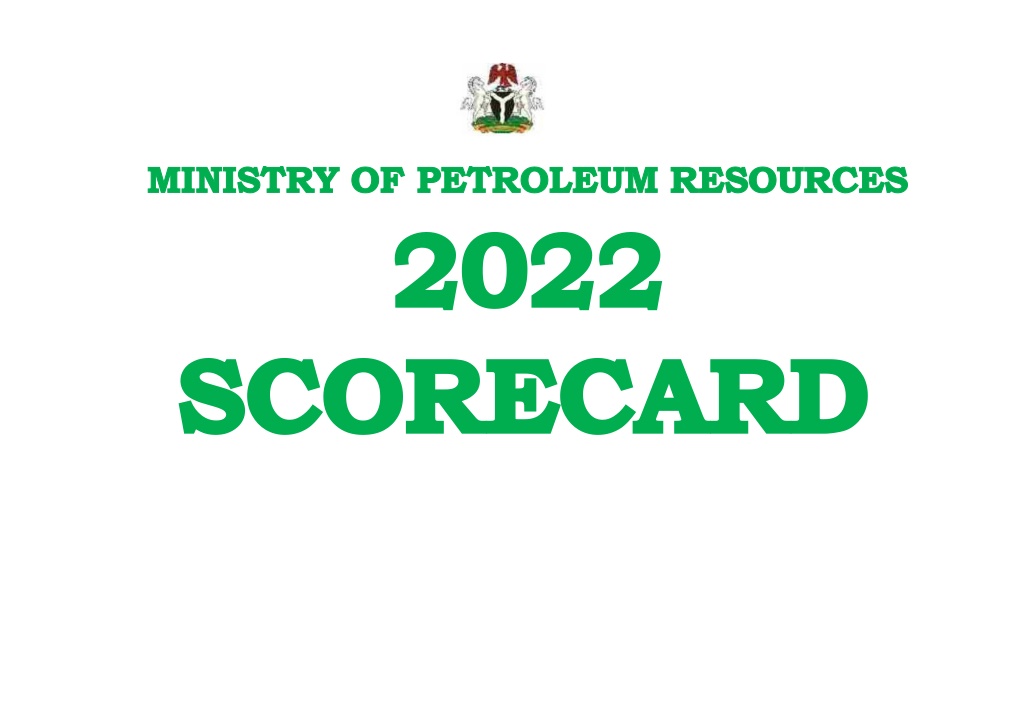





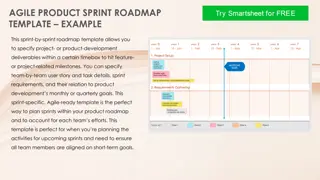



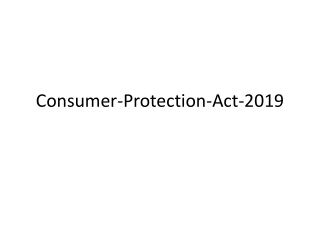

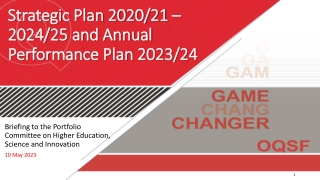
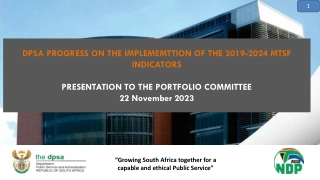
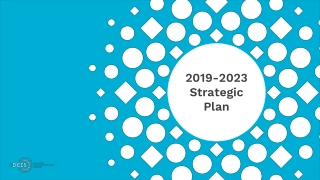
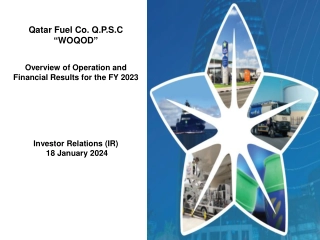





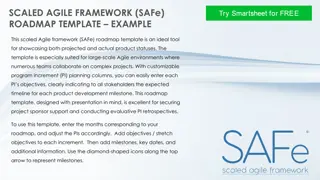
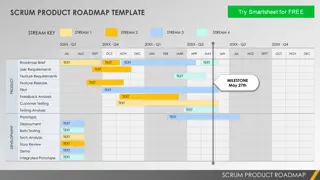
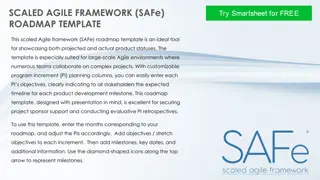
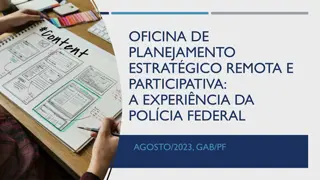

![Stakeholders' Responses to National Health Insurance Bill [B.11B-2019]: Overview](/thumb/69945/stakeholders-responses-to-national-health-insurance-bill-b-11b-2019-overview.jpg)
